Featured Scientist

Su-Jane Wang, Ph.D.
Professor
The role of natural products in the regulation of synaptic glutamate release
Glutamate is the major excitatory neurotransmitter in the central nervous system (CNS); however, excess levels may cause significant oxidative glutamate toxicity and
nerve cell injury, which are closely related to the pathogenesis of many CNS diseases, such as ischemic stroke, epilepsy, and neurodegenerative diseases. Therefore, the lev-el of glutamate must be strictly maintained within the nervous system, and agents that modulate its release have potential as therapeutics. Notably, the use of
natural plants in the treatment of neurological diseases has increased considerably, and many plant-derived compounds are effective in inhibiting presynaptic glutamate release. In our research, we used rat cerebral cortex nerve terminals (synaptosomes), a well-established model for investigate presynaptic process, to explore whether natural products regulate glutamate release and what the underlying mechanism is. We found that natural products (isosaponarin, eupatilin, eupafolin, xanthohumol, luteolin) reduced the release of glutamate from synaptosmoes elicited by the potassium channel blocker 4-aminopyridine (4-AP). This effect may be explained through the inhibition of N- and P/Q-type Ca2+ channels, which interrupts synapsin I and SNAP-25 phosphorylation by protein kinases and leads to a subsequent reduction in available synaptic vesicles in nerve terminals. Our finding shed new light on natural product’s mechanism of action in the brain, which could have implications for the use of natural products in brain disorders.
